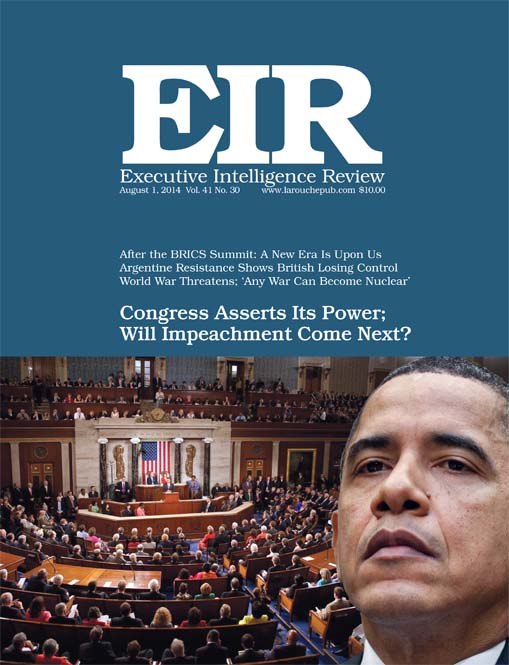|
.
|
|
|
|
Congress Asserts Its Power;
Will Impeachment Come Next?
by Nancy Spannaus and Jeffrey Steinberg
With its overwhelming vote on July 25 to reassert the unique constitutional power of Congress, not the President, to decide whether the nation should go to war, the U.S. Congress delivered a decisive repudiation of British puppet President Barack Obama. The historic vote of 370 to 40 on House Concurrent Resolution 105 simply stated that ``the president shall not deploy or maintain United States Armed Forces in a sustained combat role in Iraq without specific statutory authorization for such use.''
The resounding bipartisan vote was taken after an hour-long debate, in which lead sponsors Reps. James McGovern (D-Mass.), Walter Jones (R-N.C.), and Barbara Lee (D-Calif.), among others, stressed its significance as a return to a constitutional principle which has been consistently violated by Presidents from both parties. The principle is enshrined in Article I, Section 8, and is specified in the enabling legislation known as the War Powers Act, which HCR 105 cites.
The situation is now ripe for Congress to reassert its constitutional responsibility in other crucial areas, including the economy, by taking immediate action to reinstate the Glass-Steagall law, and the American System of economics as a whole, as Lyndon LaRouche demanded in his ``Four New Laws To Save the U.S.A. Now!''
It's obvious that there was a ``complete breakdown'' in the ability of Obama and his British sponsors to control the situation, commented LaRouche. ``They couldn't hold it together.''... |
|
|
|
|
- Congress Asserts Its Power;
Will Impeachment Come Next?
The historic bipartisan 370-40 vote in favor of House Concurrent Resolution 105 on July 25, which states that 'the president shall not deploy or maintain United States Armed Forces in a sustained combat role in Iraq without specific statutory authorization for such use,' reasserts the unique constitutional power of Congress, not the President, to make decisions on whether the nation should go to war, and delivered a decisive repudiation of British puppet President Barack Obama.
- 9/11 Commission Members Demand Release of Suppressed 28 Pages
In response to questions from family members of 9/11 victims, the co-chairmen of the 9/11 Commission insisted, at a July 22 event, that suppressed documents dealing with the role of the Saudi Kingdom in the Sept. 11, 2001 terrorist attacks on the United States should be declassified and released to the public.
Feature
- In the Wake of the BRICS Summit:
A New Era Is Upon Us
LaRouchePAC's weekly webcast of July 25, 2014 addressed the crisis in Ukraine; the downing of Malaysia Airlines Flight 17; real value in an economy vs. predatory speculation, notably as concerns the David and Goliath battle between Argentina and the vulture funds; the aftermath of the BRICS Summit, including moves by those nations to 'go nuclear'; why Congress must not recess until Obama is impeached; and much, much more.
International
Economics
- Argentine Resistance Shows British Empire Losing Control
In a July 25 speech to an audience in Argentina's northern province of Chaco celebrating the opening of an iron-smelting plant, President Cristina Fernández de Kirchner made an unmistakable allusion to the Glass-Steagall law, noting that 'there was once a law in the United States which prohibited the type of speculation' which the British Empire's predatory vulture funds have engaged in, in their war against Argentina.
- Tumen River Project:
Development for Peace in Northeast Asia
An historic event which could have a huge effect on the question of war or peace in Asia, took place July 18 in the far northeastern corner of North Korea, at the port city of Rajin (part of the Rason development zone), south of the mouth of the Tumen River which divides Russia from North Korea.
History
- The British Empire's Cold War vs. the U.S.-Russia Alliance, Part II
In this second part of a two-part series by Stuart Rosenblatt, we pick up the story of the British drive to rupture the U.S.-Russia alliance, and recruit the United States as a collaborator in a post-war attack on the Soviet Union, including the possible use of the new atomic bomb, with Churchill's Iron Curtain speech in March 1946.
|
|
|
Subscribe to EIR Online
For all questions regarding your subscription to EIR Online, or questions or comments regarding the EIR Online website's contents or design, please contact eironline@larouchepub.com.
All rights reserved © 2014, EIRNS |
|
|

